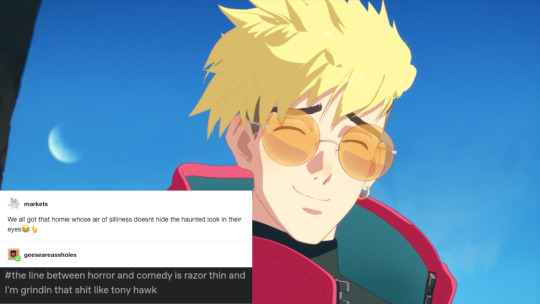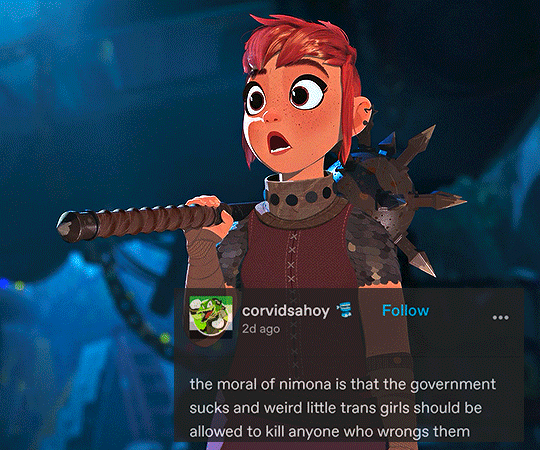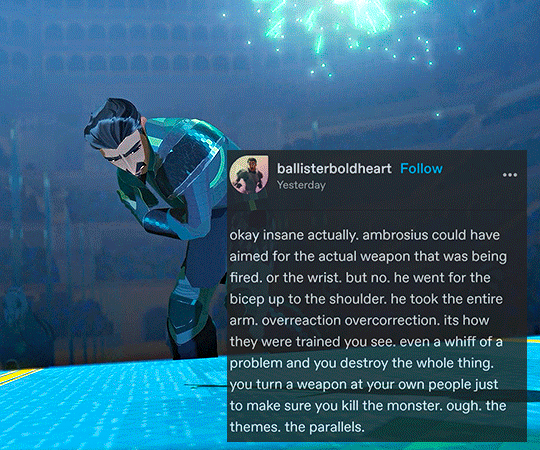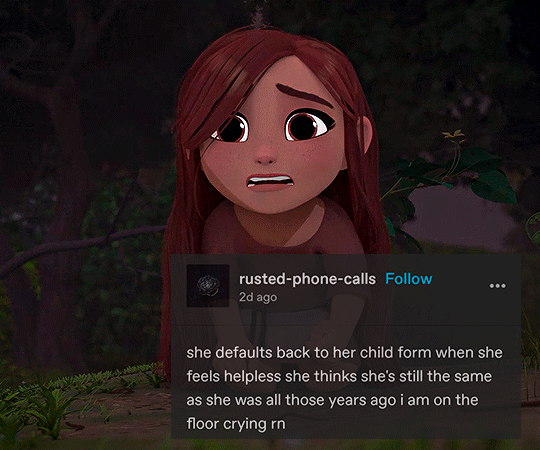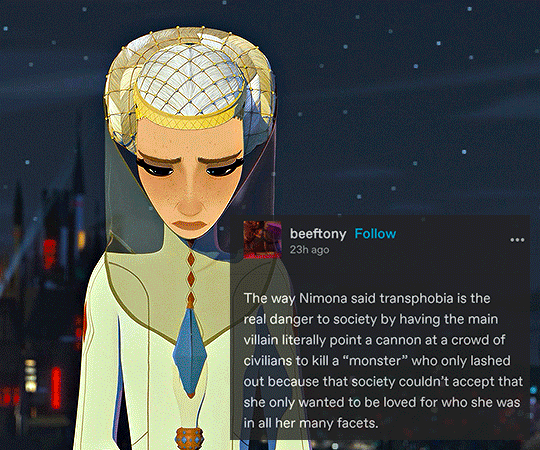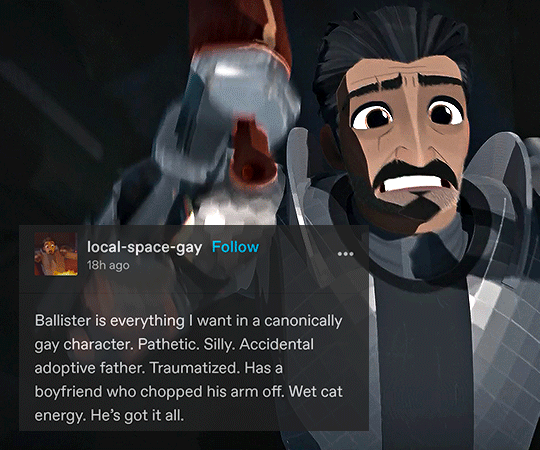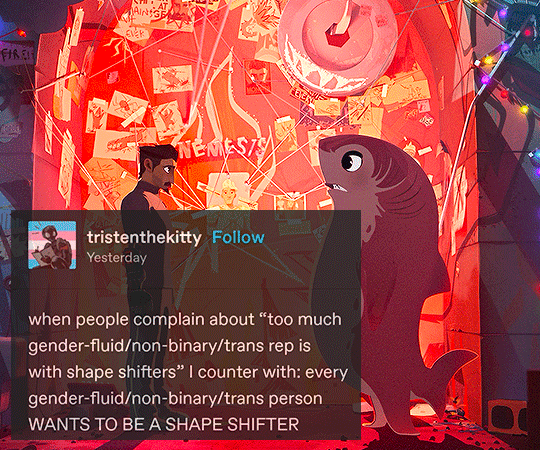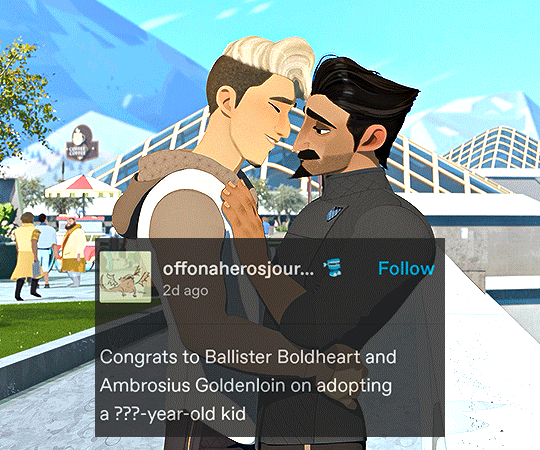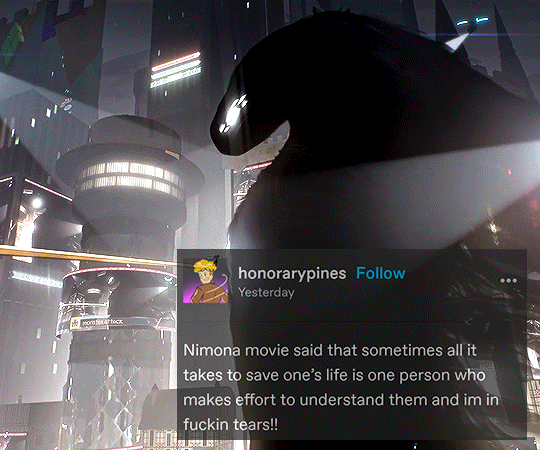Photo
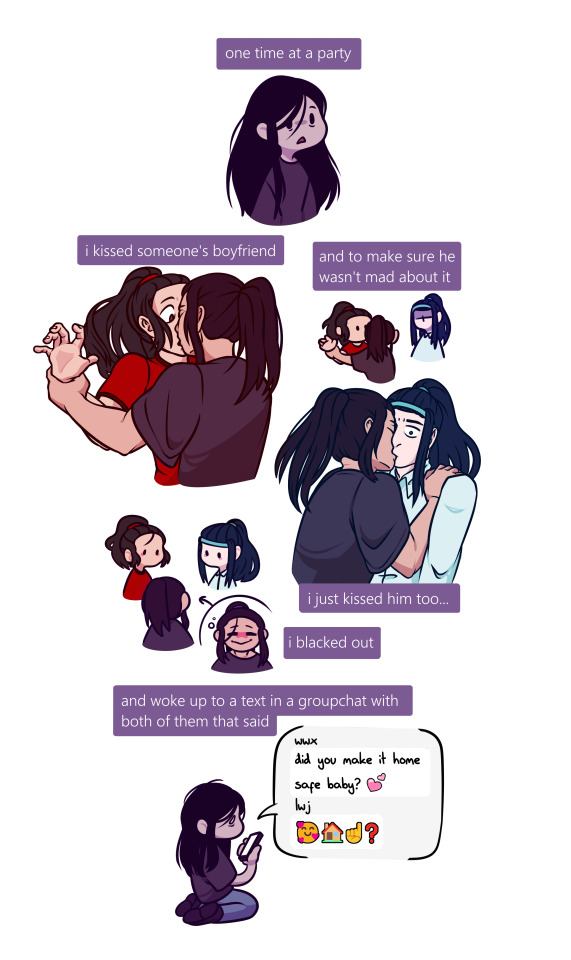
kiss your boyfriend’s husband. now.
2K notes
·
View notes
Text

Scum villain is a mess, every time you turn the page you get a headache. I love it
6K notes
·
View notes
Text
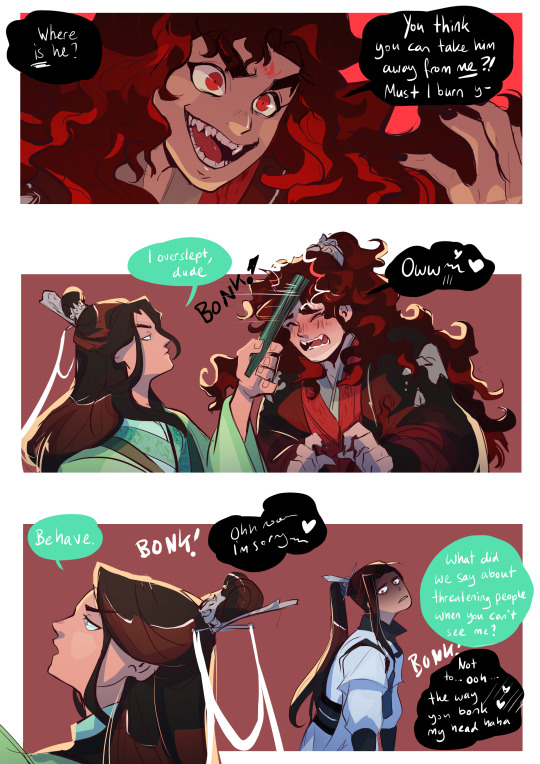
At one point, SVSSS is just basically this
6K notes
·
View notes
Note
Omg Hunxi! You’ve read SVSSS?! What did you think of it? What’s your opinion on Luo Binghe? It’s often looked down upon among the 3 novels, but I personally love it and it’s chaotic energy.
I mean, I've only read 2/3 of MXTX's novels, but I have a suspicion that SVSSS might be my favorite because the book is batshit insane and also so much fun
there's this manic energy to it that generates a heady mix of irreverence and intensity, slingshotting you from startled laughter to stunned silence and right back with the maximum amount of emotional whiplash possible
incidentally, this novel taught me more Chinese internet slang in <100 chapters than I've learned in my entire life
the best analogy I think I could make might be that... SVSSS kind of has the same energy as Bo Burnham's Inside? in that it is simultaneously a satire, a love letter, a deconstruction, and a reimagining of a genre (for Inside, Netflix comedy specials; for SVSSS, transmigration and stallion webnovels), while doing a really damn good job of its most direct purpose (being a rollicking good ride all the way down)
but sdlkfjsdlfkj Luo Binghe. oh man what a character
I feel like, no matter what long paragraphs or thematic complexity I can tease out of Luo Binghe and his characterization, his character arc and journey, no amount of words I write can beat @blackelement7's one-sentence summation of his character, which is: it's hard to be Luo Binghe
and really, much of SVSSS revolves around the deconstruction of narrative and character tropes--like, literally. (Shen Yuan as) Shen Qingqiu dismantles the ludicrously hackneyed and exaggerated plot of PIDW and accidentally puts it back together in a different shape just by, y'know, existing and being -- get ready for this -- a decent person
so Luo Binghe fits into this whole agenda by deconstructing a familiar archetype of the masculine, heroic protagonist--virile, undefeatable, hopelessly attractive, naturally talented, beloved of fate/happenstance/coincidence, unique and unlikely inheritor of multiple legacies, gifted with unrealistic sexual prowess. he has the tragic orphan origin story, the bitterly cruel and traumatic youth, then the vengeful return, the eventual violent triumph over those who had wronged him, his """happy""" ending of supreme power and supreme sexual satisfaction and supreme unbeatability
or at least, that's the original Luo Binghe
MXTX takes this larger-than-life legendary figure and shows us his hidden shadows, his deep insecurities, the flaws that have been expunged by the demands of readers and narrative (and oh boy does this book have things to say about the relationship between the author and the consumer). she takes the original Luo Binghe (and by extension, the entire stallion genre) gently by the hand and asks, have you found love?
I have a harem of hundreds of beautiful women, the original Luo Binghe replies.
have you found satisfaction? MXTX asks.
I rule the entire world, both human and demonic realms, he replies.
are you happy? MXTX asks, and cruelly, crucially--the original Luo Binghe cannot answer yes, and have that be true
MXTX takes every aspect of the original Luo Binghe and systematically subverts it: his virility is undercut by the fact that the person of his affections prefers Luo Binghe's younger, innocent self, not the virile, manly man that maidens ostensibly swoon over. Luo Binghe's undefeatability and ridiculous talents are undercut by the fact that no amount of strength, or power, or influence, will get him what he truly wants -- Shen Qingqiu's genuine love and affection. in the original PIDW, the goddamn trauma congo line that Luo Binghe gets put through only makes him stronger, laying the foundation of his eventual, triumphant, vengeful return. but in SVSSS, we see all the ways that Luo Binghe's trauma doesn't make him stronger -- in fact, leads him to incredible levels of insecurity and self-sabotage and self-hatred
or, in short:
PIDW: I've done it, I've crafted the perfect stallion novel protagonist
MXTX, busily typing: no you haven't, you've fucked up a perfectly nice young man is what you've done. look at him, he's got enough trauma to cause the apocalypse
a lot of our understanding of Luo Binghe is filtered through the lens of Shen Qingqiu, who is one of the most unreliable narrators I've ever had the privilege of laughing at. much of Shen Qingqiu's character arc in the novel is coming to realize that the people around him -- Luo Binghe, yes, but also Yue Qingyuan, Liu Qingge, all the women previously dismissed as love interests, and even, eventually, Shen Jiu -- are actually people too, not just flat fictional characters, but individuals with agendas and feelings and unwritten histories of their own. Shen Qingqiu is so preoccupied (and rightfully so!) with his fate and foreknowledge of the plot that he fails to notice for a comically long time that the plot has changed on him while he was busy jumping to conclusions about what certain people must be thinking
but back to Luo Binghe. the novel takes Luo Binghe's intense traumas and fears -- abandonment, self-loathing, rejection and very real hurt -- and makes them matter. past suffering doesn't just build character to make you stronger in the future -- you have to come to terms with it first, gain closure, let the wound heal over before you can safely build upon it. and despite having loyal subordinates, despite having more love interests than he can shake a evil sword at, Luo Binghe has no one to truly, emotionally support him
all those people flocking around him, all those women (allegedly) trying to sleep with him, and Luo Binghe doesn't have a single friend
the original PIDW would have you believe that's indicative of his strength and independence, his ability to stand alone. a Man (TM). MXTX takes one look at that and calls bullshit
or, in other words:
PIDW: I've done it, I've crafted the ultimate male fantasy
MXTX, typing faster: no you haven't, you've subscribed to toxic masculinity is what you've done. you created a lonely, overpowered young man who only knows how to deal with his problems through violence. look at him, he's got abandonment issues and unhealthy masochistic tendencies
(masochism is fine! but someone needs to gently pull Luo Binghe back into the realm of kink rather than deliberate self-harm, and while we're at it someone please give this man a hug without also detonating at the same time)
SVSSS takes the unrealistic, overperfected model of an archetypal male protagonist and shows us all the ways this person (and this model) is broken. the text constantly cracks jokes about 'the protagonist halo,' but for much of the book, Luo Binghe is never allowed to be a person--he is always The Protagonist, the half-demon spawn, the existential threat to the human cultivation world, and Luo Binghe’s continual dehumanization breaks him. and guess what? the eventual resolution of the conflict comes from nothing more and nothing less than Shen Qingqiu showing kindness. was it messy and fraught as hell? you fucking bet it was. but was the underlying message of the entire story also as simple as "but the villain needs love too!" you fucking bet it was.
this is a running theme in MXTX’s writing--we see it prominently in both SVSSS and TGCF: the colossal, literally world-saving power of empathy, and kindness, and love, and forgiveness, and that, I think, is crucial for understanding and appreciating Luo Binghe as a character
2K notes
·
View notes
Text
kind of gay for women to wear button-up blouses/shirts. why are you wearing a shirt with buttons on it? to have your buttons loosened by another woman’s tender hands?
44K notes
·
View notes
Video
Mucho confinamiento en casa veo aquí
58K notes
·
View notes
Text
ngl i used to think 25 years old was like ancient when i was 16. i think that's just how ur brain works when you're a teen tbh. the main thing to know is that your life is not over in your 20s, it's actually when you first begin figuring out how you're gonna live your life. even into our 30s. it's really not the end of your "prime" or whatever. that shit is spread by skincare and makeup companies to sell you shit. you're fine
59K notes
·
View notes
Text

iida brainrot brought to you by a clown 🙃
2K notes
·
View notes
Text
yk I haven’t met anyone with adhd who isn’t just a fucking comedian like I think everyone with adhd just has the best sense of humor
56K notes
·
View notes
Text
Let’s talk about something called the “sunk cost fallacy”.
Say that you’ve bought a concert ticket for $50 for a band that you don’t know that well. Half an hour into the show, you realize that you don’t actually enjoy the music and you aren’t having a good time - instead of leaving the concert to go do something else, however, you sit through the remaining hours of the concert because you don’t want to “waste” the cost of the ticket.
Congratulations, you’ve just fallen victim to the sunk cost fallacy.
The “sunk cost fallacy” is something that all humans are prone to when we make decisions. Simply put, it’s the human tendency to consider past costs when we make choices, even when those costs are no longer relevant. When you’re deciding whether or not to stay at that concert you aren’t enjoying, you will likely consider the cost of the ticket when you’re making your decision - for instance, you’d probably be a lot more willing to leave a $5 concert that you aren’t enjoying than a $50 concert that you aren’t enjoying. But taking the cost of the ticket into account at all is a mistake.
When you’re making a rational decision, the only thing that matters is the future. Time, effort and money that you’re spent up until that point no longer matter - it doesn’t make sense to consider them, because no matter what you decide, you can’t actually get them back. They are “sunk” costs. If you decide to stay at that concert, you are out $50 and you’ll have a mediocre evening. If you decide to go leave and do something more fun, you are out $50 and you’ll have a better evening. No matter what you choose, you have lost $50 - but choosing to leave the concert means that you haven’t also spent an evening doing something you don’t like.
The sunk cost fallacy is sometimes also described as “throwing good money after bad” - people will waste additional time, resources and effort simply to justify the fact that they’ve already wasted time, resources and effort, even if it leaves them worse off overall.
Common examples of sunk cost fallacy in everyday life include:
refusing to get rid of clothes that don’t fit or that you never wear because they were expensive
going to an event that you no longer want to go to because you already bought the ticket
spending more and more money on repairing a car or computer (or something else that depreciates in value over time) instead of buying a new one because you don’t want to waste the money you put into earlier repairs
continuing to watch a movie or TV show you aren’t enjoying anymore because you’ve already watched part of it
finishing a plate of food that you’re not enjoying or are too full to enjoy, because you don’t want to waste it
refusing to get rid of unused, unwanted or broken items in your home because the items were expensive
Perhaps the most damaging example of sunk cost fallacy in everyday life, however, is relationships.
People often use the length of a relationship to justify staying in it. You’ve probably heard this logic - you may even have used it yourself:
“I can’t break up with him or the two years we spent together will be for nothing.”
“If I leave her, it will mean I wasted the five years I spent with her.”
The reality, though, is that staying in a mediocre relationship doesn’t “give you back” the time you’ve already invested in that relationship. It just makes the relationship longer. If you stay in a bad relationship for five more years to avoid “wasting” the first two, you haven’t actually made those first two years worthwhile - you’ve simply spent seven years of your life in a bad relationship. There’s nothing we can do to recover time and effort (and in most cases, money) that we’ve already spent. But we can forgive ourselves, and we can stop letting our past mistakes continue to define our futures.
47K notes
·
View notes
